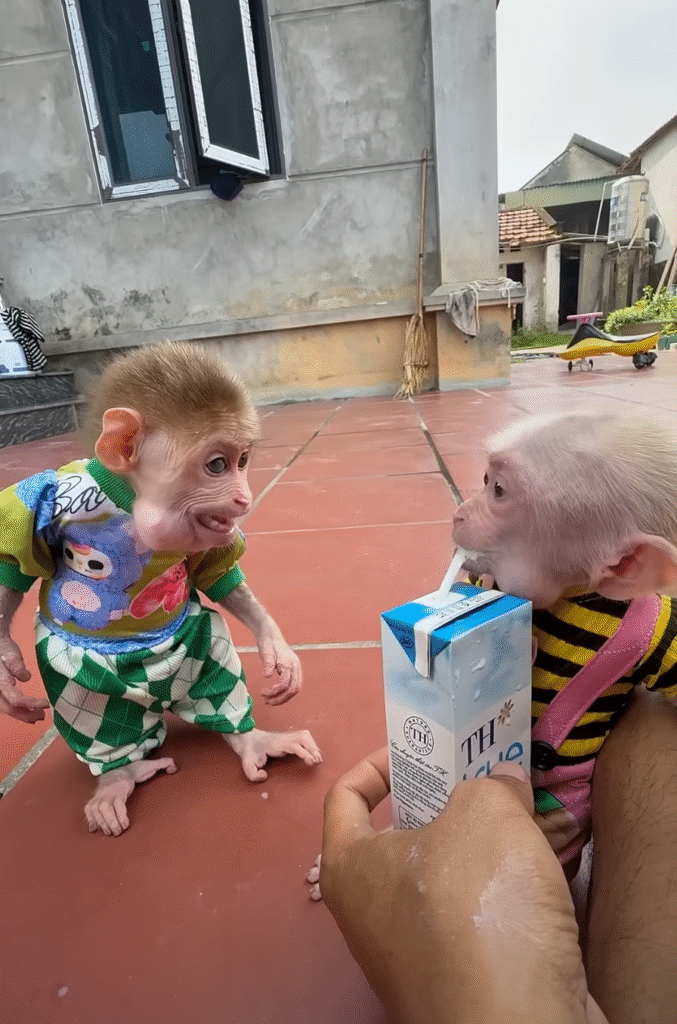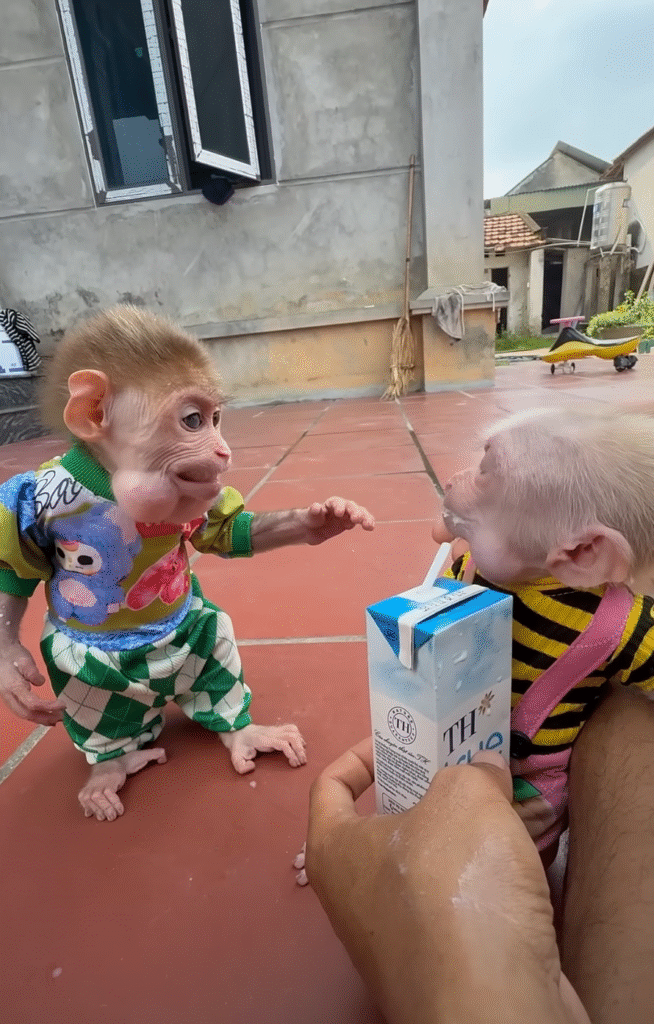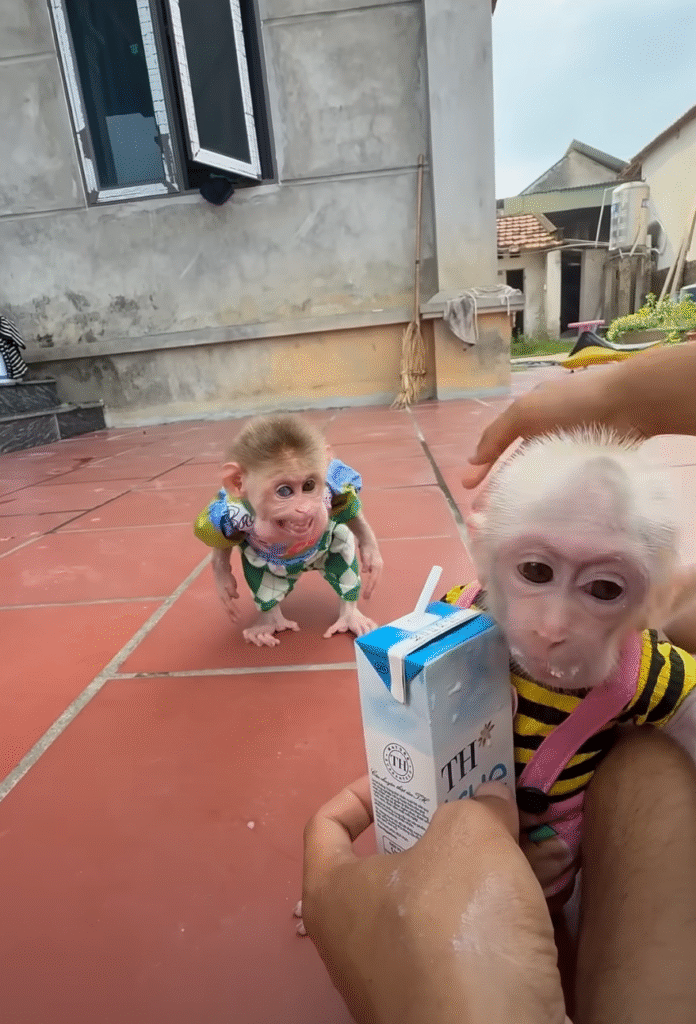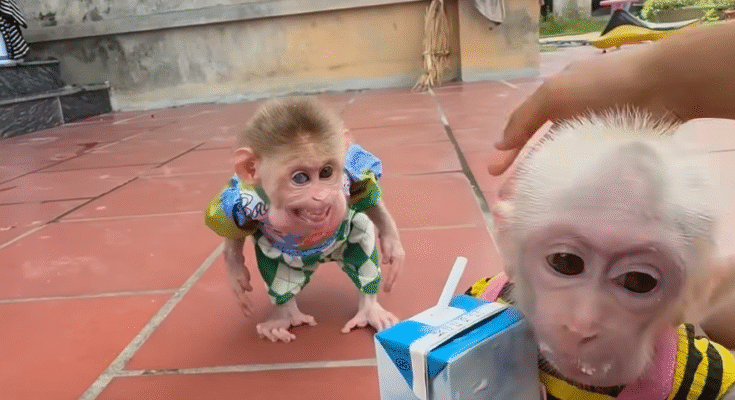In a quiet corner of the forest clearing, a family of monkeys lived happily together. Their days were filled with play, laughter, and the sweet taste of fruit from the tall trees. Among them was Bibi, a lively little monkey full of energy and mischief. Bibi was known for his playful tricks—sometimes too playful. He loved making everyone laugh, but sometimes his jokes went a little too far.
The family also had a new member—a tiny baby monkey. The baby was the pride and joy of the family, always cuddled in their mother’s arms or crawling clumsily on the soft grass. Its big round eyes sparkled with curiosity, and everyone adored it. Everyone, that is, except Bibi—who wasn’t always sure what to think.

Jealousy Grows
Ever since the baby had arrived, Bibi noticed something. His mother spent more time cuddling the baby, feeding it, and keeping it safe. Even his father often brought fruit and placed it near the baby instead of sharing it with Bibi first.
Bibi’s tail twitched as he watched. “Nobody looks at me anymore,” he thought. “It’s always the baby this, the baby that. What about me?”
The more he thought about it, the more a little spark of jealousy grew in his heart. But instead of talking about it, Bibi decided he would get attention his own way—by playing tricks.

The First Scare
One sunny afternoon, the baby sat on a mat of soft leaves, giggling as it played with a stick. Bibi crept behind a bush, his eyes full of mischief. “If I make a loud noise, the baby will squeak! Then everyone will look at me,” he thought.
He crouched low, waiting for the perfect moment. Then—“BOO!” he shouted, leaping out of the bush.
The baby’s eyes grew wide, its little hands dropped the stick, and then—WAAAAH!—it burst into tears. The wail filled the whole clearing.
Mother rushed over instantly, scooping the baby into her arms and rocking it gently. “Shh, don’t cry, little one,” she whispered. Father frowned, looking at Bibi.
“Bibi,” Father said firmly, “why did you scare the baby?”
Bibi shuffled his feet, looking down. “I just wanted to play,” he muttered.
But Mother’s eyes were serious. “The baby is small. It doesn’t understand your tricks yet. You must be gentle.”
Bibi nodded, but inside he still felt jealous.

More Tricks
The next day, Bibi tried again. The baby was crawling slowly toward a piece of fruit when Bibi jumped out from behind a rock, shaking a big leaf in his hands. The sudden rustling made the baby flinch and tumble backward. Once again, it burst into tears.
The family sighed. “Bibi, you can’t keep scaring the baby,” his older sister Lala scolded. “It doesn’t think it’s funny—it’s frightened.”
“But I was only playing!” Bibi protested.
“Play in a kind way,” Lala replied. “The baby will laugh with you when it feels safe, not scared.”
Bibi didn’t answer, but her words stuck in his mind.
The Big Scare
One afternoon, while the sun dipped low and painted the forest in golden light, the baby was sitting happily near the tree roots. It cooed softly, grabbing leaves and trying to clap its tiny hands.
Bibi, hiding behind the trunk, decided to try his biggest scare yet. He piled leaves on his head and face, making himself look like a strange forest creature. He crept closer and closer, then let out a loud roar.
The baby froze for a moment, then let out the loudest cry yet. Tears streamed down its face as it scrambled toward Mother.
This time, the whole family gathered. Father crossed his arms, Lala shook her head, and Mother held the baby tightly.
“Bibi,” Mother said in a calm but serious voice, “you love your sibling, don’t you?”
Bibi hesitated, then nodded. “Of course I do.”
“Then why make it cry?” Father asked.
Bibi’s eyes filled with tears. “Because… because when the baby cries, you all look at me. Nobody looks at me anymore. You only care about the baby.”
The clearing grew quiet. Lala walked up and hugged him gently. “Oh, Bibi. We all love you. Just because there’s a baby doesn’t mean we’ve forgotten you.”
Mother placed the baby down for a moment and pulled Bibi into her other arm. “You will always be my child, my Bibi,” she whispered. “But the baby is small and needs more help right now. That doesn’t mean we love you any less.”
The baby, still sniffling, reached out a tiny hand toward Bibi. Its round eyes blinked at him, not with anger, but with trust.
A Change of Heart
Bibi looked at his sibling, guilt washing over him. “I didn’t mean to hurt you,” he whispered. Slowly, he took the baby’s hand in his. “I promise… I won’t scare you again.”
The baby hiccuped and gave a tiny smile. It wasn’t afraid anymore.
From that day on, Bibi tried something new. Instead of jumping out and shouting, he made silly faces to make the baby laugh. Instead of rustling leaves, he tickled the baby’s tummy gently. Instead of roaring, he told little stories in funny voices.
And to his surprise, the baby laughed—not with fear, but with joy. The sound was even better than the attention he got before. It made him feel proud, not guilty.
The Family’s Joy
The family noticed the change. Father patted Bibi’s shoulder. “See? You are the baby’s big brother. You can make it smile better than anyone.”
Lala teased, “Now you’re the family clown, but in the best way!”
Mother kissed his head. “This is the Bibi I know—playful, funny, but also loving.”
Every day after that, the clearing rang with laughter. The baby giggled as Bibi danced, made silly noises, and played gentle games. Instead of being scared, it felt safe with him.
Conclusion
The story of “Bibi scares the baby” became one the family told often. They laughed about his leaf disguise and his loud “boo,” but they always ended the story with the lesson: love means thinking of others.
Bibi learned that attention wasn’t about making someone cry—it was about making them feel happy and safe. And in the end, that brought him more love than he ever expected.
Because when Bibi stopped scaring the baby and started caring for it, he discovered the truth: the best kind of fun is the kind that brings smiles, not tears.
And from then on, the two siblings weren’t just family—they were best friends, filling the forest with laughter and love.



